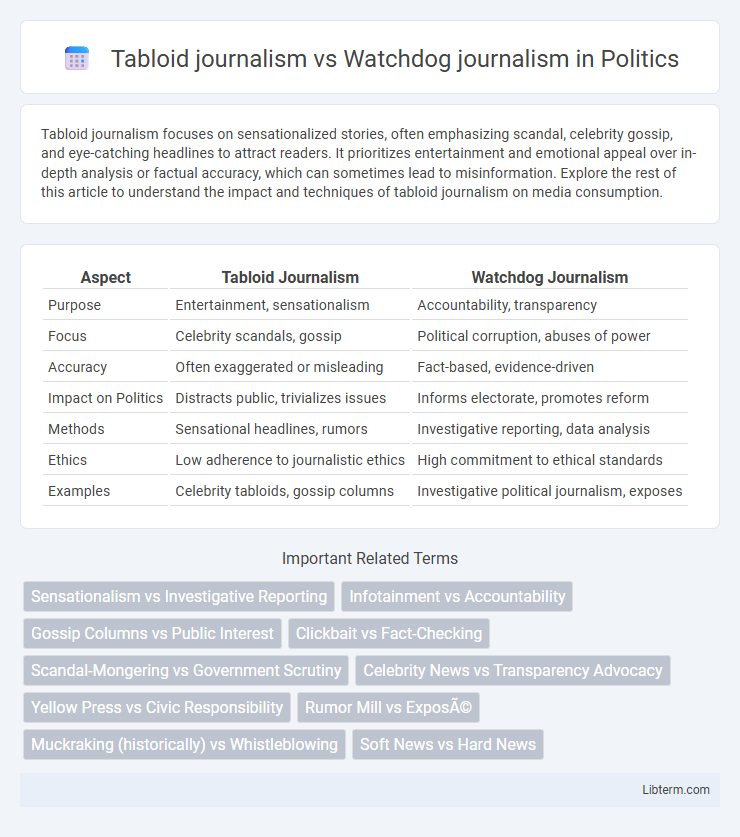Tabloid journalism focuses on sensationalized stories, often emphasizing scandal, celebrity gossip, and eye-catching headlines to attract readers. It prioritizes entertainment and emotional appeal over in-depth analysis or factual accuracy, which can sometimes lead to misinformation. Explore the rest of this article to understand the impact and techniques of tabloid journalism on media consumption.
Table of Comparison
| Aspect | Tabloid Journalism | Watchdog Journalism |
|---|---|---|
| Purpose | Entertainment, sensationalism | Accountability, transparency |
| Focus | Celebrity scandals, gossip | Political corruption, abuses of power |
| Accuracy | Often exaggerated or misleading | Fact-based, evidence-driven |
| Impact on Politics | Distracts public, trivializes issues | Informs electorate, promotes reform |
| Methods | Sensational headlines, rumors | Investigative reporting, data analysis |
| Ethics | Low adherence to journalistic ethics | High commitment to ethical standards |
| Examples | Celebrity tabloids, gossip columns | Investigative political journalism, exposes |
Introduction to Tabloid and Watchdog Journalism
Tabloid journalism emphasizes sensationalism, celebrity gossip, and eye-catching headlines designed to attract mass audiences quickly. Watchdog journalism focuses on investigative reporting that holds power accountable by exposing corruption, misconduct, and social injustices. Both styles serve different purposes: tabloids prioritize entertainment and attention, while watchdog journalism aims to inform the public and promote transparency.
Defining Features of Tabloid Journalism
Tabloid journalism is characterized by sensationalism, emphasizing scandal, celebrity gossip, and eye-catching headlines to attract readers. It often prioritizes emotional appeal and entertainment value over factual accuracy or in-depth analysis. Distinctive features include vivid imagery, simplified language, and a focus on human-interest stories that provoke strong reader reactions.
Core Principles of Watchdog Journalism
Watchdog journalism centers on transparency, accountability, and public interest, rigorously investigating corruption, abuse of power, and social injustices to hold authorities accountable. It relies on verified sources, factual accuracy, and ethical reporting practices to inform citizens and promote democratic governance. Unlike tabloid journalism, which emphasizes sensationalism and entertainment, watchdog journalism prioritizes evidence-based reporting and societal impact.
Historical Roots and Evolution of Both Styles
Tabloid journalism originated in the early 20th century, focusing on sensationalism, celebrity gossip, and eye-catching headlines to attract mass audiences. Watchdog journalism has roots in the muckraking movement of the early 1900s, emphasizing investigative reporting to expose corruption and hold power accountable. Both styles evolved with advances in media technology, but tabloids prioritize entertainment while watchdog journalism upholds democratic transparency and public interest.
Impact on Public Perception and Trust
Tabloid journalism often sensationalizes stories, which can distort public perception and erode trust in media by prioritizing entertainment over accuracy. Watchdog journalism rigorously investigates and exposes wrongdoing, enhancing public awareness and fostering trust through accountability and transparency. The contrasting approaches significantly influence how audiences evaluate the credibility and reliability of news sources.
Ethics and Credibility in Reporting
Tabloid journalism often prioritizes sensationalism and entertainment, which can compromise ethical standards and diminish credibility by emphasizing scandal over accuracy. Watchdog journalism upholds rigorous ethical principles, prioritizing truth, accountability, and public interest, thereby enhancing its trustworthiness and credibility. Ethical reporting in watchdog journalism fosters informed citizenry by scrutinizing power structures responsibly, contrasting with the often misleading narratives found in tabloids.
Role of Sensationalism vs Fact-Checking
Tabloid journalism emphasizes sensationalism to attract readers through exaggerated headlines and emotionally charged stories, often sacrificing factual accuracy for entertainment value. Watchdog journalism prioritizes rigorous fact-checking and investigative reporting to hold power accountable and provide the public with verified information. The contrasting roles of sensationalism in tabloids and fact-checking in watchdog media highlight the differing objectives of attracting attention versus ensuring transparency and truth.
Influence on Political and Social Discourse
Tabloid journalism often influences political and social discourse by emphasizing sensationalism and scandal, which can distort public perception and prioritize entertainment over factual reporting. Watchdog journalism, by contrast, plays a critical role in holding power to account through investigative reporting, thereby fostering transparency and informed civic engagement. The impact of these journalistic styles shapes the quality of democratic debate and public trust in media institutions.
Notable Case Studies: Tabloid vs Watchdog Coverage
Tabloid journalism often highlights sensational stories like the Princess Diana car crash in 1997, focusing on scandal and emotional appeal, whereas watchdog journalism provided in-depth investigations such as in the Watergate scandal, emphasizing accountability and government transparency. The News of the World phone-hacking scandal exposed unethical tabloid practices, contrasting with The Guardian's rigorous reporting that upheld journalistic integrity through detailed evidence and public interest focus. These case studies reveal how tabloid journalism prioritizes sensationalism, while watchdog journalism drives social change through fact-based scrutiny and investigative depth.
The Future: Balancing Entertainment and Accountability
Tabloid journalism often prioritizes sensationalism and entertainment to attract larger audiences, whereas watchdog journalism focuses on holding power accountable through in-depth investigation and factual reporting. The future of journalism requires a strategic balance where media outlets integrate engaging storytelling techniques without compromising the integrity and rigor essential for transparency and public trust. Leveraging digital platforms and data analytics can help blend entertainment value with robust accountability, ensuring informed and captivated audiences.
Tabloid journalism Infographic

 libterm.com
libterm.com